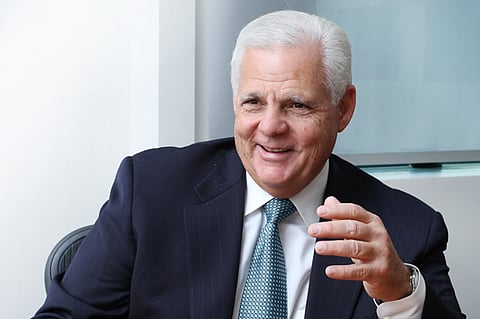Online data fight is not slowing down
More companies today are storing data that contains sensitive data as an integral part of their business

The ongoing fight to protect online data isn’t going to slow down in the foreseeable future and is only going to escalate as personal technology becomes more powerful, according to EMC chairman and CEO Joe Tucci.
“I wish I could say I could see an end to this, but I can’t.”
EMC is a Boston-based technology company that specialises in data storage, but over the last decade has diversified into virtualised networks (virtualisation), security, cloud computing and big data. Tucci was in the region speaking to clients in Dubai and Abu Dhabi.
Tucci, who says he spends about half of his time travelling, says the one thing he hears wherever he travels is concerns over security. Cybercrime has steadily been on the rise for years, but with high-profile breaches in security, such as the alleged theft of data from by the US’ National Security Agency by Edward Snowden, client interest has surged, Tucci said.
Speaking of the mindset of today’s technology leaders, Tucci said, “It stands to reason, that if something like that can happen with the NSA, then maybe I should be more worried myself that I have an Edward Snowden in my organisation.”
However, more and more companies today are storing data that contains sensitive data as an integral part of their business. In today’s business environment, that data is constantly being accessed, meaning it also can be targeted by what Tucci simply sums up as “bad people”.
“When it comes to our world, you need to store data in a real-time manner,” he said. “You need to store it cost effectively. You need to be able to mine over that data and make decisions that can even save people’s lives.”
Market growth
According to a report by Gartner, Inc, a technology research company, the worldwide security technology and services market is forecast to reach $67.2 billion (Dh246.6 billion) in 2013, up 8.7 per cent from $61.8 billion in 2012. The market is expected to grow to more than $86 billion in 2016. McAfee’s in July reported that US companies where losing an estimated $100 billion annually due to cybercrime.
To help protect that data, Tucci says EMC’s first line of defence is still decryption, and more of it, since it is still the easiest and simplest method of protection.
But in the case of Snowden, who was authorised to access the data he allegedly stole, companies need to consider much more advanced security.
Tucci said EMC has been focusing on security analytics, which looks at various techniques such as monitoring behavioural activity, such as detecting where a person is when accessing data, and using existing combination platforms, such as mobile phone text messages (SMS), to help stop intruders.
However, Tucci says that given today’s technology environment and the growth of both personal computing, including more powerful computers, and the rise of cloud computing, it’s only a matter of time before governments need to step in.
You’re going to see more governments play bigger roles, because they say, “I’ve got help, to use my power.” Governments can use their money to bring in more people to protect their people.
Sign up for the Daily Briefing
Get the latest news and updates straight to your inbox



